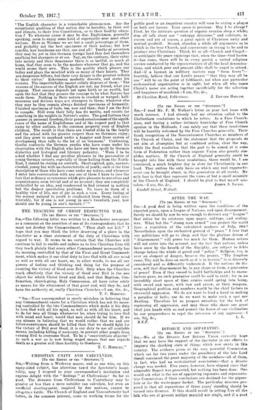THE TEACHING OF CHRIST RESPECTING WAR. fTo Tan EDITOR or
ran SPECTATOR.") Sia,—The following letter was written to a Manchester newspaper as a comment on the assertion of one of its correspondents that Ile must not disobey the Commandment, "Thou shalt not kill." I hope that you may think the letter deserving of a place in the Spectator as a clear statement of the duty of Christians with regard to war. It seems to me certain that the Churches will continue to fail to enable and induce us to lire Christian lives till they teach plainly that every other Commandment necessarily has its meaning controlled by that of the First and Great Command. meat, which makes it our chief duty to love God with all our mind as well as with all our heart, or, in other words, to use all our powers of feeling and thinking and doing for the purpose of ensuring the victory of Good over Evil. Only when the Churches teach effectively that the victory of Good over Evil is the one object for which Christ lived and died, and that Baptism, Con- firmation, church-going, Holy Communion, all have value solely- as means for the attainment of that great end, will they be, and have the authority of, really Christian Churches.—I am, Sir, Ac., T. C. Hoesesus "Sta,—Tour correspondent is surely mistaken in believing That any Commandment exists for a Christian which has not its mean- ing controlled by the two Commandments which make it his duty to love God with all his mind, as well as with all his heart, and to do, for men all things whatsoever he, when trying to love God with mind and heart, would that men should do for him. If we nre sincere in believing that we would rather that we and our fellow-countrymen should be killed than that we should fight for the victory of Evil over Good, it is our duty to use all available means, including killing if necessary, to prevent other people from causing Evil to overcome Good. To be a 'conscientious objector' in such a war as is now being waged means that one regards death as a greater evil than hostility to Goodness.
T. C. HOWL, AU. "


































 Previous page
Previous page